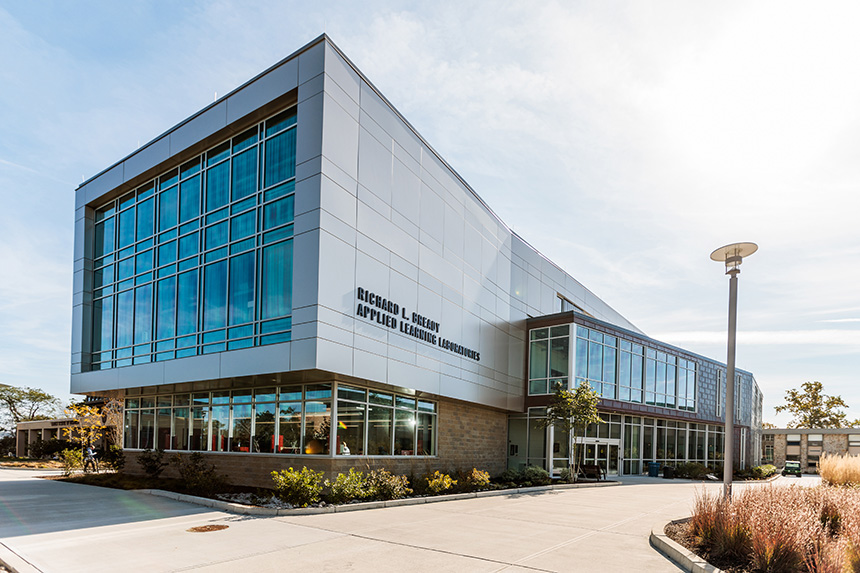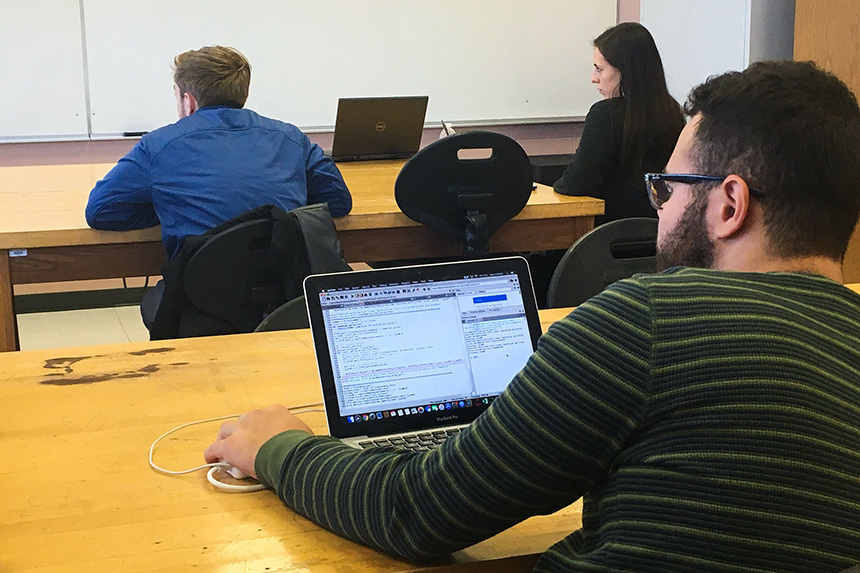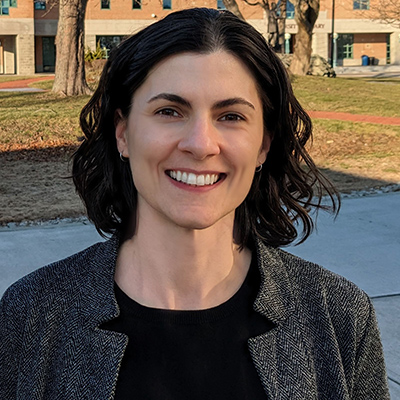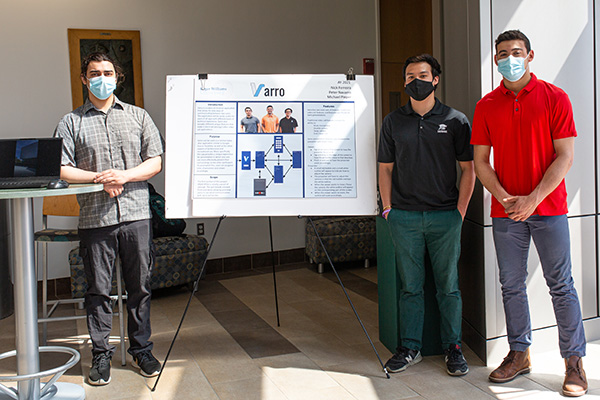Computer Science
With coursework that combines solid theory, real-world practice and specialization options, our Computer Science students are ready for high-demand career fields from app developers to large scale software system designers.
The Bachelor of Science in Computer Science is accredited by the Computing Accreditation Commission of ABET, under the General Criteria and the Computer Science Criteria.
To read more about our academic offerings, or to view full course descriptions, please refer to our University Catalog.
Success After Graduation

Placement of Graduates
Through the years, our graduates consistently find success in employment or in graduate schools within six months of graduation.

First Job, Dream Industry
SECCM graduates land their first jobs in their targeted industries, such as engineering, defense, construction, manufacturing, technology, or consulting.

Average Starting Salary
of 2022 SECCM graduates.
Degree Requirements
Program Requirements
Required Courses
Choose a minimum of 7 additional credit hours
Choose a minimum of 7 additional credit hours of COMSC courses at or above the 200 level, at least 3 credit hours must be above the 300 level.
State-of-the-Art Facilities

The newest building on the Bristol campus, the Richard L. Bready Applied Learning Laboratories is designed to foster collaboration and innovation while offering high-tech resources for experiential learning. The three-floor, 27,325-square-foot building features seven cutting-edge laboratories, senior design project rooms and open spaces dedicated to hands-on education. Computer Science students have access to the Computer Science Software Experimentation Lab, the BIM/Virtual Reality Lab, the Advanced Technology and Innovation Lab, collaborative workspaces, project rooms, design labs, and more.
Choose Your Track
Students can complete either a Bachelor of Science or a Bachelor of Arts in Computer Science.
Students pursuing either a B.S. or B.A. degree learn the fundamentals of how a computer works, how it stores data, how a programming language is written, how to analyze algorithms, and how to design software. The first semester is the same for all students; during the second semester, B.S. and B.A. candidates take slightly different routes.
In the B.S. program, students use their strong mathematical backgrounds and knowledge of computing to design and build systems that keep organizations functioning and contributing to society. The interdisciplinary B.A. program is less focused on mathematics and is designed for students who are interested in the applications of technology, communications, sales, and other career paths.
Course Highlight: Machine Learning
Tailor Your Expertise with a Specialization
Beginning in your third year, you will have the flexibility to focus your education in a specific area by selecting a specialization. Students may choose from data science, digital systems, human-centered computing, intelligent and autonomous systems, or mathematics, or can consult with their faculty advisor to create a custom specialization.
Data Science Specialization
Data science looks at large and complex data. You’ll learn how to understand, organize, and manipulate it to create solutions that benefit organizations. This specialization is best for students who enjoy analyzing or building algorithms, and exploring large and complex data sets.
Digital System Specialization
This specialization focuses on the hardware of a computer. Students will take a close look at circuits, learn how they are designed, and understand how they interact with software in devices like cell phones.
Human-Centered Computing Specialization
Humans and computers interact on a daily basis and human-centered computing focuses on how humans adapt and organize their lives around technology. This specialization allows students to better understand how to design, develop, and implement computing systems that support human activities.

Intelligent and Autonomous Systems Specialization
Devices like Alexa, Google Home, and Siri are all adapted by learning how computer systems can make decisions and behave autonomously. This specialization allows students to learn about artificial intelligence, and how to build programs and systems to perform certain tasks.
Mathematics Specialization
Data analytics uses a combination of Computer Science, mathematics, and statistics to gain valuable knowledge from data. The application of analytics can be used in a variety of ways for any industry. This specialization is for students who wish to pursue a double major in mathematics, or those who want to pursue studies or careers in the analytical side of computing.
Custom Specialization
Students interested in more than one focus of Computer Science, or those who want as broad an educational experience as possible, can work with their faculty advisor to design a custom specialization perfectly tailored to their interests.
Learn From Faculty Experts
 Sonya Cates, Ph.D.
Sonya Cates, Ph.D.
Associate Professor of Computer Science
Sonya Cates’ interests include human-computer interaction, artificial intelligence, and data science. As a student at MIT, her work focused on the intersection of artificial intelligence and human-computer interaction. Before joining the faculty at Roger Williams University, she worked in finance, using large data sets to predict movements in financial markets.
“My favorite thing about teaching in the Computer Science program at RWU is the small class size," she said. "I can really get to know all of my students and see their progress through all four years.”
Alumni Share Their Experiences
“RWU's Computer Science program provided me with a strong foundation that allowed me to pursue a deeper understanding of my desired specialization. The small class sizes made me feel as though I was having a conversation with my professors as opposed to a lecture. This was the main reason I chose to attend Roger.”
Casey Knight ’22
Major: Computer Science, Intelligent and Autonomous Systems
Full Stack Software Engineer at Fidelity Investments in Merrimack, N.H.
Graduates Work at Top Companies
Our graduates work at top companies, including:
- Fidelity Investments
- Naval Undersea Warfare Center
- Wayfair
- MEDITECH
- Hanover Insurance
- Synchrony Financial
- Raytheon
Work with Real Clients
During senior year, students complete a year-long design project, building a significant software system for a real client. Examples of past projects include:
• MotionFusion: A multi-year project developing an interactive presentation system using 3D cameras.
• ADAM-4: Modernizing a fluids mechanics lab to take advantage of better computing hardware and software.
• Varro: A proof of concept to determine the possibility of remotely accessing and directing a smartphone camera.

• TrickyMaps: A game linking GPS, photographs, and paper maps to develop map reading skills and offer travel entertainment.
• NiCoMi: A system that helps evaluate the effectiveness of social media-based marketing campaigns.
• CPM Scheduling: A software system to help Construction Management students identify ways to reduce scheduling time for projects.
Ways to Get Involved
Multicultural STEM Alliance
The Multicultural STEM Alliance aims to strengthen the sense of community among students of color in STEM majors at RWU by offering activities, mentorship, and networking opportunities at and outside of the university.


